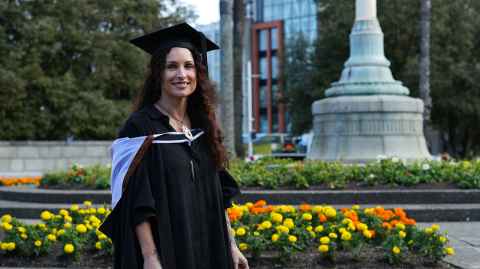Graduate on a mission to save lives
1 May 2025
First-hand experience of addiction and recovery has inspired Emily Duncan’s academic journey.

Emily Duncan believes trauma underlies most addiction, because she has seen it in her own life and those of recovering addicts.
Now Emily is graduating at the Faculty of Medical and Health Sciences’ May ceremony with a masters looking at evidence for trauma-informed rehabilitation.
She has “worked her butt off”, writing a thesis, raising a toddler as a solo mum and working as a clinical lead practitioner for Grace Foundation, a rehabilitation service comprising 70 percent Māori and 25 percent Pacific people.
It’s been a long journey for Emily, who grew up in the slums of Manila, the eldest of three children of missionary parents. “Extreme poverty, sickness, death and grief were a way of life,” she recalls.
It was a transitory life interspersed with furloughs to cities in Australia and New Zealand and England, before settling in Auckland aged 14.
“I was a teenager full of rage, a distorted identity and high anxiety. I had depressive episodes quite regularly and, looking back, I lived in constant survival mode and developed multiple coping mechanisms from a young age.”
By age 21, Emily was using several substances to manage her moods and regulate emotions stemming from toxic environments, with no vision for a future beyond her drug use and partying. Abusive relationships and an eating disorder were the norm.
Through her twenties, she became distant with her family, was in and out of hospital as drugs wreaked havoc on her body and experienced several overdoses. At 27, Emily escaped New Zealand for Australia.
When she returned to New Zealand for her sister’s wedding, she witnessed the lives of her younger siblings, with their careers and families, and her mother confronted her about her substance use. It prompted Emily, for the first time, to see what she’d considered ‘normal’, and as a way of coping with life, as addiction.
“I started looking at life patterns and seeing that all my family members are Christians, living by faith, and they didn’t use substances. I saw that addiction was a pathway I had used to cope with life,” she says.
She searched online for Christian rehabilitation organisations and found Transformations Australia. After completing an 18-month residential programme, Emily was employed there for the next ten years, working her way up to general manager of six campuses. After a decade of working in both clinical and management roles, however, she experienced burnout and a breakdown. She returned to New Zealand to rest, study and get to know her family.

After completing a theology degree at Laidlaw College, Emily found she needed a qualification in addiction to work clinically in New Zealand. It took perseverance, due to minor criminal charges, but eventually she completed a Postgraduate Diploma in Health Sciences at the University, specialising in addiction studies. This coincided with joining Grace Foundation and developing a trauma-informed programme.
“A lot of programmes are behaviour-modification based – it’s all about clean time; they are not trauma-informed, and most of these organisations have high relapse rates.
“The solution is to deep dive into the emotional pain that was caused by your childhood adversity. Then to go on this healing journey of reconnecting with yourself, understanding your identity and figuring out what your life purpose is – then building a life that you don’t need to escape from.”
Her masters supervisor, Dr Rodrigo Ramalho (Rama), a senior lecturer in the Department of Social and Community Health, describes her as an ideal student. Rama says Emily came up with the research question of ‘what role, if any, does trauma, particularly intergenerational trauma, play in developing an addiction?’
“She had a look at everything that has been published around that topic, which is not a great deal, reviewed it and found links,” says Rama.
Adds Emily: “There is a link between childhood trauma impacting attachment and parenting styles, subsequently creating childhood trauma for the next generation. That increases the risk of developing unhealthy coping mechanisms that can lead to the development of addiction.
“The science of epigenetics, alongside a surge of data over the last 25 years delving into the theory of trauma, academically verified something I had already found in my own practice.”
Emily has seen people in therapeutic community rehabilitation centres across Australia and New Zealand breaking the cycle of addiction through healing from trauma, providing hope that it is possible.
She is now considering a doctorate, to continue seeking more tools for evidence-based healing for her trauma-informed programmes.
“That is where I would like to have a voice and to come up with more solutions for Aotearoa’s most vulnerable communities.”
– Jodi Yeats
This article first appeared in the May 2025 issue of UniNews.